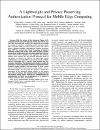A lightweight and privacy-preserving authentication protocol for mobile edge computing
Abstract
With the advent of the Internet-of-Things (IoT), vehicular networks and cyber-physical systems, the need for real-time data processing and analysis has emerged as an essential pre-requite for customers' satisfaction. In this direction, Mobile Edge Computing (MEC) provides seamless services with reduced latency, enhanced mobility, and improved location awareness. Since MEC has evolved from Cloud Computing, it inherited numerous security and privacy issues from the latter. Further, decentralized architectures and diversified deployment environments used in MEC platforms also aggravate the problem; causing great concerns for the research fraternity. Thus, in this paper, we propose an efficient and lightweight mutual authentication protocol for MEC environments; based on Elliptic Curve Cryptography (ECC), one-way hash functions and concatenation operations. The designed protocol also leverages the advantages of discrete logarithm problems, computational Diffie- Hellman, random numbers and time-stamps to resist various attacks namely-impersonation attacks, replay attacks, man-in-the-middle attacks, etc. The paper also presents a comparative assessment of the proposed scheme relative to the current state-of-the-art schemes. The obtained results demonstrate that the proposed scheme incurs relatively less communication and computational overheads, and is appropriate to be adopted in resource constraint MEC environments.
Collections
- Computer Science & Engineering [2484 items ]


